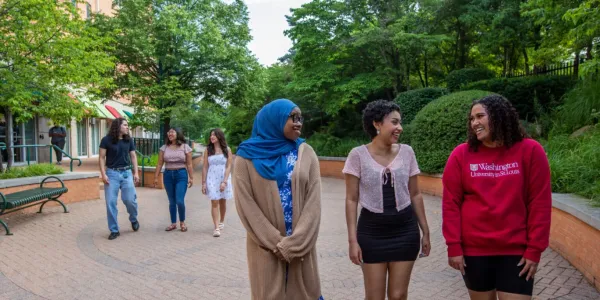Rafia Zafar, professor of English, African and African American studies, and American culture studies, concludes a long career as a well-loved and respected teacher, scholar, and administrator.

When Professor Rafia Zafar retires from WashU this year, she’ll be handing over the title of longest-serving Black woman faculty member in Arts & Sciences. As a professor of English, African and African American studies, and American culture studies, her career will leave a lasting impact on many departments and programs.
Originally from New York City, Zafar received a bachelor’s degree in English from City College of New York, a master’s in English and comparative literature from Columbia University, and a doctorate in the history of American civilization from Harvard University.
She came to WashU in 1998 with her husband William Paul, professor emeritus and founding member of the Program in Film and Media Studies. Coming from the University of Michigan, where she was an assistant professor of English, Zafar was delighted by the smaller size of WashU. It allowed her to meet and befriend faculty from different divisions, and the class sizes meant she could get to know her students. She taught a variety of courses over the years, but three of her most popular offerings were “Black Women Writers,” “Topics in African-American Literature: Rebels, Sheroes, and Race Men,” and “Recipes for Respect: Black Foodways in the United States.”
During her WashU career, Zafar received prestigious fellowships from the Ford Foundation, the American Antiquarian Society, and the Virginia Center for the Humanities. In 2007, she held the Walt Whitman Distinguished Fulbright Chair at Utrecht University in the Netherlands. From 2014 to 2015, she was a National Endowment for the Humanities scholar-in-residence at the Schomburg Center for Research in Black Culture at the New York Public Library.

Zafar also had the opportunity to shape the university as an administrator. She was the director of the Program in African & African American Studies — a precursor to the department that exists today — from 1999 to 2003. She also served as associate dean for diversity and inclusiveness in the Graduate School of Arts & Sciences, where she directed the Chancellor’s Graduate Fellowship, aimed at increasing the number of under-represented groups in academic positions. From 2017 to 2021 she helmed the Mellon Mays Undergraduate Fellowship Program. These leadership positions “allowed me to expand my ability to mentor, one of my favorite things to do as a professor,” she said.
In recent years, Zafar’s scholarship has included work on African American foodways. In 2019, she published “Recipes for Respect: African American Meals and Meaning,” an exploration of the role of foodways in Black culture. She’s become an international expert on the subject, taking multiple trips to Italy to teach a seminar on Black foodways at the University of Gastronomic Sciences.
In retirement, Zafar looks forward to moving to New York City, spending time with her high school friends, working on writing projects, and reading.




